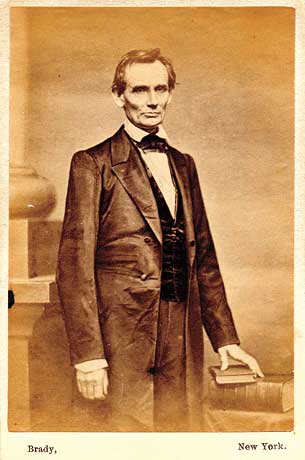
Abraham Lincoln's marble temple in Washington is as familiar as the back of a penny. But the figure enthroned inside will always be above and apart, a demigod — martyr, prophet, scourge and healer rolled into one. That he was killed on Good Friday with hosannas of triumph still echoing in his ears added a religious overtone to the grief of his countrymen and, from the hour of his death, guaranteed that Lincoln could never again fit into the frame of an ordinary man. (See pictures of Lincoln.)
But he was a man, in ways as familiar as the guy next door. He liked sports, dirty jokes and being the alpha male. He flirted with pretty women and suffered occasional deafness when his wife was talking. He put his feet on the furniture, encouraged his sons to roughhouse and break things, suffered from bad digestion. And he spent a lot of his life thinking about money. Not that he was greedy — quite the opposite — but he had a poor boy's understanding of the fact that money is a powerful tool, the lever that makes ambition possible. "The penniless beginner in the world," he once explained, "labors for wages awhile, saves a surplus with which to buy tools or land, for himself; then labors on his own account another while, and at length hires another new beginner to help him." This steady, gradual advance, Lincoln insisted, is "the prosperous system, which opens the way for all — gives hope to all, and energy, and progress, and improvement of condition to all." We know it as the American Dream, and it certainly worked for him. Beginning with nothing, Lincoln managed to educate himself, raise a family in comfort and subsidize his history-shaping political campaigns — all thanks to that useful instrument, money. (See 10 elections that changed America.)
This mundane fact may seem so obvious that it isn't worth mentioning in the middle of a flood of Lincoln hoopla. February marks the bicentennial of Lincoln's birth. Bookstore shelves are sagging under the weight of new Lincoln tomes. Museums, galleries and lecture halls across the country and around the world have scheduled Lincoln programs. New pennies are being minted, old controversies revisited. And this already keen interest has been further stoked by what Lincoln Bicentennial Commission executive director Eileen Mackevich calls an "Obama wind." The new President, another slender fellow from Illinois, has been busy reading about Lincoln, quoting Lincoln, evoking Lincoln. The Lincoln Memorial was among Barack Obama's first stops in Washington, and when Obama was sworn in last month it was, for many, the culmination of a long march that began with Lincoln's Emancipation Proclamation. (See the greatest speeches of all time.)
Inevitably, the main focus of all this attention is Lincoln's views on race and equality, and his leadership during the cataclysmic Civil War. Yet given the fix we're in, Lincoln's economic ideas deserve some attention too. Long before he gave his first speeches about Union or slavery, Lincoln was a crusader on questions of economic development and banking. He cut his political teeth on conditions painfully topical for us today: an economic crash that left the young legislator struggling to shore up a failing bank while arguing for government spending on public works.
Lincoln would surely be intrigued to see the son of an African man living with his wife, the descendant of slaves, in his old digs at 1600 Pennsylvania Avenue. But what might fascinate him even more, were he to materialize for his bicentennial, is the extent to which the American economy has fulfilled and exceeded his urgent vision of an entrepreneurial, innovative marketplace geared to upward mobility. The man who once said "I know of nothing so pleasant to the mind, as the discovery of anything which is at once new and valuable" would have a swell time visiting Apple headquarters or touring a genetic-engineering lab. Among the mansions and pretensions of our millionaires and billionaires, he would shrug and say (as he said in 1860), "I don't believe in a law to prevent a man from getting rich; it would do more harm than good. [But] while we do not propose any war upon capital, we do wish to allow the humblest man an equal chance to get rich with everybody else."
See pictures of Obama behind the scenes on Inauguration Day.